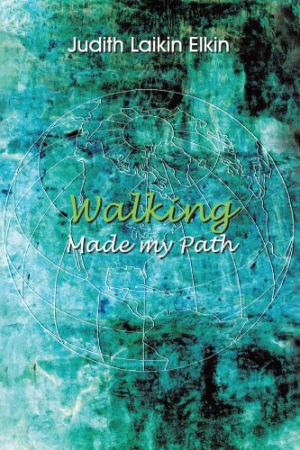Walking Made My Path
Judith Laikin Elkin grew up in 1930s Detroit and identifies herself as a witness to two significant developments: “the emergence of a cohort of American women who rewrote the rules for a newly gendered society; and the gradual absorption of Jews, marginalized in the world into which I was born, into American life.” It is against the backdrop of these societal changes that she writes her autobiography.
While this historical context in itself makes for fascinating reading, Walking Made My Path is engaging for another reason: the author’s considerable ability to weave a tale that has all the elements of a good story, including memorable characters, tragedy, loss, humor, and a protagonist who overcomes adversity to succeed.
The reader witnesses the growth and development of the author through her childhood and college years, after which she took a position with the male-dominated United States Foreign Service. It was her invitation from Israel’s prime minister to visit and reside permanently in Israel, however, that presented Elkin with her most difficult challenge: “How to balance my patriotism for the United States with the dream of reviving the Jewish people by building a new Jewish state?” Intrigued by the possibility of staying in Israel, the author instead chose to continue her work with the Foreign Service, a decision which would chart the course of the rest of her life.
Perhaps the most unique aspect of Elkin’s story is the fact that she traveled throughout Latin America, which resulted in the founding of an entirely new field of scholarship: Latin American Jewish Studies. Elkin writes of her experiences attempting to locate Jews in various Latin American countries; these adventures alone make her book memorable. The eventual result of her efforts became Elkin’s grandest achievement: the creation of the Latin American Jewish Studies Association (LAJSA), which she presided over until her retirement.
Elkin’s writing is a pleasure to read, and her anecdotes add spice and vitality to her story. One episode, for example, occurred at the American Embassy in London, when she was required to assist a sheikh with a visa, so he could travel to the United States and make an important visit to the United Nations. Her counterpart in the British Colonial Office called her afterward and asked, “Would your father accept one hundred camels?” It was the sheikh’s way of expressing his gratitude—he wanted to make Elkin his third wife. With good humor, she politely declined the offer.
Judith Laikin Elkin’s story offers a rare look at a woman who broke ground in any number of ways. More than that, hers is a journey of self-discovery that sheds light on what it was like to grow up as an American Jew at a time when the horrors of the Holocaust and the birth of Israel were current events. It is an important story well told and well worth reading.
Reviewed by
Barry Silverstein
Disclosure: This article is not an endorsement, but a review. The publisher of this book provided free copies of the book and paid a small fee to have their book reviewed by a professional reviewer. Foreword Reviews and Clarion Reviews make no guarantee that the publisher will receive a positive review. Foreword Magazine, Inc. is disclosing this in accordance with the Federal Trade Commission’s 16 CFR, Part 255.

